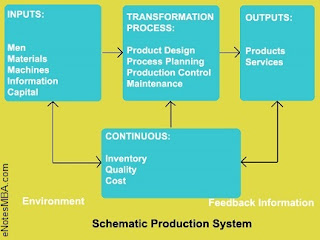MBA Notes - Functions and Classifications of Advertising
Question - What is advertising? Explain in detail the functions and classifications of advertising.
Answer
Meaning of Advertising - Advertising is an activity of attracting public attention to a product or business, as by paid announcements in the print, broadcast, or electronic media.
Advertising is the promotion of a company’s products and services
though different mediums to increase the sales of the product and
services. It works by making the customer aware of the product and by
focusing on customer’s need to buy the product. Globally, advertising
has become an essential part of the corporate world. Therefore,
companies allot a huge part of their revenues to the advertising
budget. Advertising also serves to build a brand of the product which
goes a long way to make effective sales.
Functions of Advertising - Following are the basic functions of advertising:
1. To distinguish product from competitors' products
There are so many products of same category in the market and they competes with each other, advertising performs the function of distinguishing advertiser's product from competitors.
2. To communicate product information
Product related information required to be communicated to the targeted customers, and advertisement performs this function.
3. To urge product use
Effective advertisement can create the urge within audience for a product.
4. To expand product distribution
When the market demand of a
particular product increases, the number of retailer and distributor involved in sale of that product also increases, hence product distribution get expanded.
5. To increase brand preference
There are various products of different bands are available, the brand which is effectively and frequently advertised is preferred most.
6. To reduce overall sale cost
Advertising increases the
primary demand in the market. When demand is there and the product is
available, automatically the overall cost will decrease, simultaneously the cost of sales like distribution cost, promotional cost also get decreased.
Classification of Advertising - Advertising can be classified on the basis of Function, Region, Target Market, Company demand, Desired response, and Media.
A) Classification on the basis of function
- Advertisement informs the customers about a product
- Advertisement persuades the consumers to buy a products
- Advertisement reminds existing customers about the presence of the product in the market
Let us discuss some important types of advertising based on the functional aspect of advertising.
Informative advertising: This type of advertising informs
the customers about the products, services, or ideas of the firm or
organization.
Persuasive advertising: This type of advertising
persuades or motivates the prospective buyers to take quick actions to
buy the products or services of the firm. Example: “Buy one, get one
free”.
Reminder advertising: This genre of advertising reminds
the existing customers to become medium or heavy users of the products
or services of the firm that have been purchased by them at least once.
This type of advertising exercise helps in keeping the brand name and
uses of the products in the minds of the existing customers.
B) Classification on the basis of region
Advertisements can also be classified on the basis of the region, say:
Global advertising: It is executed by a firm in its global
market niches. Reputed global magazines like Time, Far Eastern Economic
Review, Span, Fortune, Futurist, Popular Science. Cable TV channels are
also used to advertise the products through out world. Supermodels and
cinema stars are used to promote high-end products Examples: Sony,
Philips, Pepsi, Coca Cola, etc.
National advertising: It is executed by a firm at the
national level. It is done to increase the demand of its products and
services throughout the country. Examples: BPL (Believe in the best).
Whirlpool Refrigerator (Fast Forward Ice Simple) etc.
Regional advertising: If the manufacturer confines his
advertising to a single region of the country, its promotional exercise
is called Regional Advertising. This can be done by the manufacturer,
wholesaler, or retailer of the firm. Examples: Advertisements of
regional newspapers covering those states or districts where these
newspapers are circulated. Eg. The Assam Tribune (only for the NE
region) etc.
Local advertising: When advertising is done only for one
area or city, it is called Local Advertising. Some professionals also
call it Retail Advertising. It is sometime done by the retailer to
persuade the customer to come to his store regularly and not for any
particular brand. Examples: Advertisements of Ooo la la, Gupshup (Local
FM channels) etc.
C) Classification on the basis of target market
Depending upon the types of people who would receive the messages of
advertisements, we can classify advertising into four subcategories:
Consumer product advertising: This is done to impress
the ultimate consumer. An ultimate consumer is a person who buys the
product or service for his personal use. This type of advertising is
done by the manufacturer or dealer of the product or service. Examples:
Advertisements of Intel, Kuttons (shirt), Lakme (cosmetics) etc.
Industrial product advertising: This is also called
Business-to-Business Advertising. This is done by the industrial
manufacturer or his distributor and is so designed that it increases
the demand of industrial product or services manufactured by the
manufacturer. It is directed towards the industrial customer.
Trade advertising: This is done by the manufacturer to
persuade wholesalers and retailers to sell his goods. Different media
are chosen by each manufacturer according to his product type, nature
of distribution channel, and resources at his command. Hence, it is
designed for those wholesalers and retailers who can promote and sell
the product.
Professional advertising: This is executed by
manufacturers and distributors to influence the professionals of a
particular trade or business stream. These professionals recommend or
prescribe the products of these manufacturers to the ultimate buyer.
Manufacturers of these products try to reach these professionals under
well-prepared programmes. Doctors, engineers, teachers, purchase
professionals, civil contractors architects are the prime targets of
such manufacturers.
Financial advertising: Banks, financial institutions,
and corporate firms issue advertisements to collect funds from markets.
They publish prospectuses and application forms and place them at those
points where the prospective investors can easily spot them.
D) Classification on the basis of desired responses
An ad can either elicit an immediate response from the target
customer, or create a favourable image in the mind of that customer.
The objectives, in both cases, are different. Thus, we have two types
of advertising under this classification.
Direct action advertising:
This is done to get immediate responses from customers. Examples: Season's sale, purchase coupons in a magazine.
Indirect action advertising: This type of advertising
exercise is carried out to make a positive effect on the mind of the
reader or viewer. After getting the advertisement he does not rush to
buy the product but he develops a favourable image of the brand in his
mind.
Surrogate advertising: This is a new category of
advertising. In this type of promotional effort, the marketer promotes
a different product. For example: the promotion of Bagpiper soda. The
firm is promoting Bagpiper Whisky, but intentionally shows soda. They
know that the audience is quite well aware about the product and they
know this fact when the actor states, "Khoob Jamega Rang Jab Mil
Baithenge Teen Yaar ... Aap ... Main, Aur Bagpiper").
E) Classification on the basis of the media used in advertisement
The broad classification based on media is as follows:
Audio advertising:
It is done through radio, P A systems, auto-rickshaw promotions, and four-wheeler promotions etc.
Visual advertising: It is done through PoP displays,
without text catalogues, leaflets, cloth banners, brochures, electronic
hoardings, simple hoardings, running hoardings etc.
Audio-visual: It is done through cinema slides, movies, video clips, TV advertisements, cable TV advertisements etc.
Written advertising: It is done through letters, fax
messages, leaflets with text, brochures, articles and documents, space
marketing features in newspapers etc.
Internet advertising: The world wide web is used
extensively to promote products and services of all genres. For example
Bharat Matrimony, www.teleshop.com, www.asianskyshop.com etc.
Verbal advertising: Verbal tools are used to advertise
thoughts, products, and services during conferences, seminars, and
group discussion sessions. Kinesics also plays an important role in
this context.





